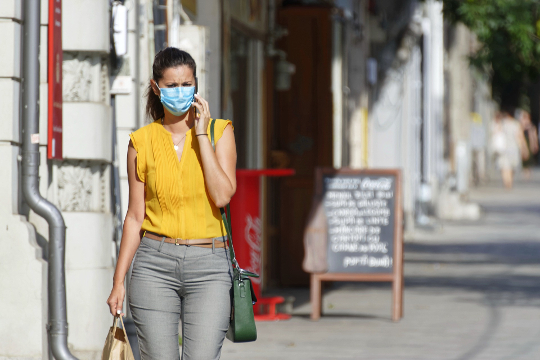
Image by Candid_Shots
While our results show that the young and healthy tend to generate far fewer droplets than the older and less healthy, they also show that any of us, when infected by COVID-19, may be at risk of producing a large number of respiratory droplets.
Researchers have discovered that obesity, age, and COVID-19 infection correlate with a propensity to breathe out more respiratory droplets—key spreaders of SARS-CoV-2, the virus that causes COVID-19.
Scientists and public health experts know that certain people, known as “super-spreaders,” can transmit COVID-19 with incredible efficiency and devastating consequences.
Using data from an observational study of 194 healthy people and an experimental study of nonhuman primates with COVID-19, researchers found that exhaled aerosol particles vary greatly between subjects.
Get The Latest By Email
Older people with higher body mass indexes (BMI) and an increasing degree of COVID-19 infection had three times the number of exhaled respiratory droplets as others in the study groups.
Researchers found that 18% of the human subjects accounted for 80% of the exhaled particles of the group, reflecting a distribution of exhaled aerosol particles that follows the 20/80 rule seen in other infectious disease epidemics—meaning 20% of infected individuals are responsible for 80% of transmissions.
Aerosol droplets in nonhuman primates increased as infection with COVID-19 progressed, reaching peak levels a week after infection before falling to normal after two weeks. Notably, as infection with COVID-19 progressed, viral particles got smaller, reaching the size of a single micron at the peak of infection.
Tiny particles are more likely to be expelled as people breathe, talk, or cough. They can also stay afloat much longer, travel farther in the air, and penetrate deeper into the lungs when inhaled.
The increase in exhaled aerosols occurred even among those with asymptomatic cases of COVID-19, says Chad Roy, director of infectious disease aerobiology at the Tulane University National Primate Research Center and corresponding author of the paper, published in the Proceedings of the National Academy of Sciences.
“We’ve seen a similar increase in droplets during the acute infection stage with other infectious diseases like tuberculosis,” Roy says. “It seems likely that viral and bacterial infections of the airway can weaken airway mucus, which promotes the movement of infectious particles into this environment.”
The generation of respiratory drops in the airways varies between people depending on their body composition, says lead author David Edwards, professor of the practice of biomedical engineering at Harvard University.
“While our results show that the young and healthy tend to generate far fewer droplets than the older and less healthy, they also show that any of us, when infected by COVID-19, may be at risk of producing a large number of respiratory droplets,” he says.
About the Authors
Chad Roy, director of infectious disease aerobiology at the Tulane University National Primate Research Center and corresponding author of the paper, published in the Proceedings of the National Academy of Sciences.
Lead author David Edwards, professor of the practice of biomedical engineering at Harvard University.
Additional coauthors are from Massachusetts Institute of Technology, Massachusetts General Hospital, Harvard University, and Tulane. Original Study
Related Video
books_health







